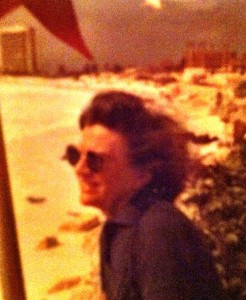It used to be that photography was understood to be an instantaneous approximation of kinetic life. Where the word “snapshot” originated. My mother was always in motion. Why I won’t apologize for the blur here. She spent her life doing everything for everybody, but — and this is key — she never lost herself along the way. Not the downtrodden one, not the victim, not the identity-less cipher, she chose the beneficiaries of her effort and love. Her husband, her children, her parents, her husband’s parents, she expended everything for them.
And as I look back on it, all these were co-equal to her. Not my children above all and civilization be damned. Or any of the other rotten excuses for narcissistic obsession we hear so much about these days. She could be stern with the kids and a friend up to a point and a proud cheerleader, but she also understood my dad’s role to guide and discipline us. And her own. I once failed to do my arithmetic homework and begged her to do sums for me. She did them in a trice after breakfast and before the bus arrived, laying down the law that she would watch me perform those same sums when I got home from school. Which she did and I did.
She had some give on the question of whether dad had to know what we had done wrong that day, though she wasn’t afraid to blackmail us. If we atoned properly, our haunted fearful looks would gradually go away. This time, he wouldn’t know.
About those sums. You have no idea how fast she did them. Smart as a whip but never said so. She had a degree in Romance languages — French, Portuguese, Spanish — and as a result worked as a translator at DuPont and as an, of course, “secretary” on the Manhattan Project. In college she was also a jock, swimmer and archer for the Buckeyes. In married life she was an indefatigable knitter and seamstress, producing masterful Irish sweaters for me and all the clothes my sister wore until prep school mandated fancy labels, as well as an endless number of monogrammed bookbags whose proceeds went to our school. She made most of her own clothes too, while supporting every event at our elementary school, from cupcakes to classroom painting, and looking after both sets of my grandparents on an almost daily basis. You literally could never see her not in motion.
Why her only (but multiple) traffic tickets were for failing to come to a full stop at a red light. She was in too much of a hurry. But she could drive fast in her ’65 Mustang.
It’s possible I misspoke above. There was one love that the loss of damaged her. Her dad had wanted a son. (She was supposed to be Glen; she was Glenna instead.) He compensated by bestowing on her the love and attention he’d have given a boy. He taught her how to throw a baseball, and so it happened she could play catch with me. Every Fourth of July he awakened her with a huge firecracker under her bedroom window. She set her alarm hoping to beat him with his own medicine, but by her own admission never made it. When he died at 90 some of the life went out of her.
My wife only met her when she had become an invalid, desiccated by years of over strong blood pressure medication. (When it became critical, a new doctor said, “Good God, woman, how you can you still be alive with no electrolytes?”)
She once weighed 130 pounds and could probably lick you in a fight. At the end she weighed 80 and had only the strength to give Patrick the greyhound a few Cheetos. But the native generosity never left, apart from a Scottish penury that seems to run in the family.
She was never a great cook (when my dad was away in England and France, my sister and I coined the term Europe burgers to describe the ruined stones of ground beef she put between buns with ketchup to feed us), she could hold a grudge with the best of those who had German-Scottish roots, and she never forgave my dad for the incredible fact he reminded her too often of, that in their only two meetings Dad’s Cornell Big Red had defeated her Ohio State Buckeyes.
But you should have seen the two of them together the night they went out for a night on the town in Paris. He was a dagger in his tuxedo and she was a cool blonde dream in a Paris hairdo and a dress that today we could call bling. Princess Grace had nothing on her.
My mother. My dad painted multiple portraits of her. He was unusually adept at catching the truth of his subjects. But he was never satisfied with one of them. Something about a blur, I suspect.
-
I missed this post somehow. My apologies. It’s beautiful and I thank you for sharing.
Comments are now closed.


1 comment